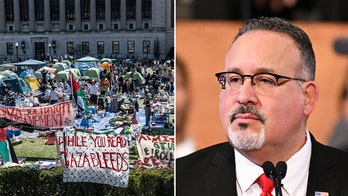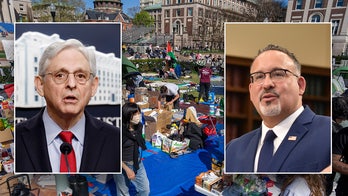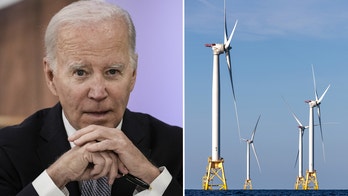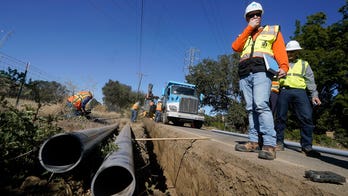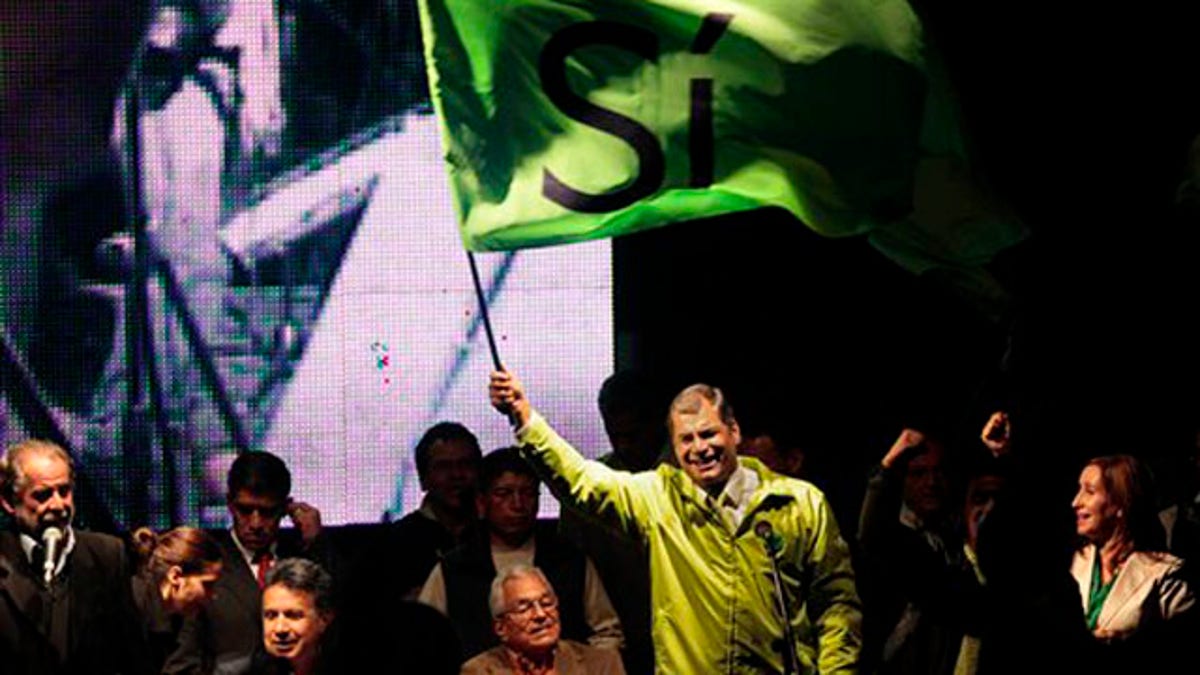
Ecuador's President Rafael Correa, top, accompanied by members of his government and collaborators, waves a flag that reads in Spanish "Yes," during a meeting in Quito, Ecuador, Saturday, May 2011. Correa declared victory after an exit poll indicated voters approved all 10 ballot questions in a referendum Saturday, an outcome critics say will tighten his grip on power, inhibit press freedom and lessen the judiciary's independence. (AP Photo/Dolores Ochoa)
Ecuador's president is feeling good after yet another victory at the polls.
President Rafael Correa didn't wait for official results to confidently claim victory for a 10 ballot-question referendum he devised that critics say will help him consolidate power at the expense of press freedom and judicial independence.
Ecuador's leftist leader was celebrating Saturday's vote -- what he called the last triumph of "this dream that is called citizen's revolution" -- long before significant official results were counted.
An exit poll by SP Investigacion y Estudios, which regularly does work for the government, had found voters approved all the questions by greater than 60 percent.
But as official results tricked in, the victory margin appeared much lower. With 25 percent counted early Sunday, all questions were shown winning but with an average of closer to 52 percent of valid votes.
The slow count notwithstanding, the chief of an Organization of American States observer team, Enrique Correa of Chile, said voting appeared to go smoothly and there was no evidence of fraud.
Rafael Correa, a leftist, U.S.-trained economist, has brought unusual stability to a small, traditionally volatile South American nation and he crowed in a TV interview Saturday night about his eighth straight victory at the polls, beginning with his 2006 election.
He's followed the electoral playbook written by his Venezuelan ally President Hugo Chavez, getting the constitution rewritten and largely obliterating organized political opposition. Re-elected two years ago, Correa can run again in 2013.
Some questions on Saturday's ballot were straightforward, such as whether to ban bullfighting and gambling. Others were complex, requiring multiple-page annexes vexing even to some attorneys.
Two of the most controversial would bar owners of news media from having other commercial interests and create a government media oversight panel.
Critics say the referendum consolidated power in favor of Correa.
"I think its a duplicitous ballot that curbs liberties in which I profoundly believe," said Enrique Espinoza Ortiz, a 77-year-old lawyer who voted in a middle-class Quito district. "I'm not against the government. But this time I just said no."
Former President Lucio Gutierrez, a fierce Correa opponent, said Correa was using the vote "to take justice by force and dominate the news media."
Correa called approval of the media ownership question "a historic deed."
"We are going to diffuse the power in this country," he said.
On Twitter, Correa's office quoted him as saying the news media, bankers and some in the Roman Catholic church were "our great adversaries" on Saturday.
Correa proposed the referendum in January, three months after a violent, seemingly spontaneous police revolt over benefit cuts that he called a coup attempt.
Much like Chavez, he has faced a largely hostile press. Since February, he has filed defamation charges against five journalists, seeking million-dollar fines and jail terms for some.
One key ballot question called for dissolving Ecuador's judicial oversight council and replacing it with a temporary body that would redo a court system that's long been submissive to the will of the executive.
Another would allow authorities to detain suspected criminals longer without filing charges.
Five of the questions mandate constitutional change. The other five require congressional action.
Firmly in South America's leftist bloc, Correa enjoys a 65 percent approval rating in a country that in the decade prior to his election saw three presidents, most recently Gutierrez, ousted in popular revolts.
Haughty and quick-tempered, Correa has alienated many former allies, including leaders of Ecuador's indigenous movement. They are angry with his insistence that the state have the last word on subsoil and water rights.
But Correa's populist programs, such as $35 monthly payments to nearly 2 million poor families, construction of low-income housing and a commitment to universal free education, have boosted his popularity in this small Andean nation of 14.3 million people.
Many who voted "yes" said it was out of esteem for his government.
"We Ecuadoreans should be committed and help out if we want things to change," said Maria Lourdes Silva, a 43-year-old cosmetics saleswoman.
Political analyst Adrian Bonilla of the FLACSO think tank says Correa has ably leveraged Ecuador's oil wealth and an effective tax system into popular programs.
Former President Osvaldo Hurtado, whose Christian Democrats like all Ecuador's traditional parties have all but disappeared, said Correa has conjured "a perfect dictatorship" by manipulating democratic institutions.
He has alienated foreign investors by renegotiating oil contracts to give Ecuador a higher cut of profits and has forged business ties with China and Iran.
Last month, Correa expelled U.S. Ambassador Heather Hodges over a diplomatic cable leaked by WikiLeaks in which she suggested Correa was mindful but tolerant of corruption at the top of Ecuador's national police.
The Associated Press contributed to this report.
Follow us on twitter.com/foxnewslatino
Like us at facebook.com/foxnewslatino

